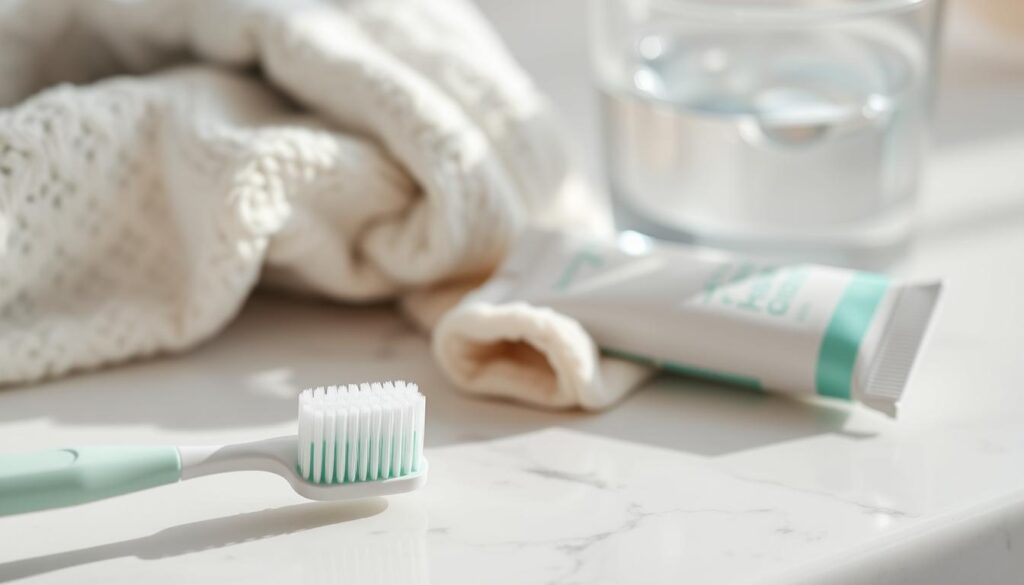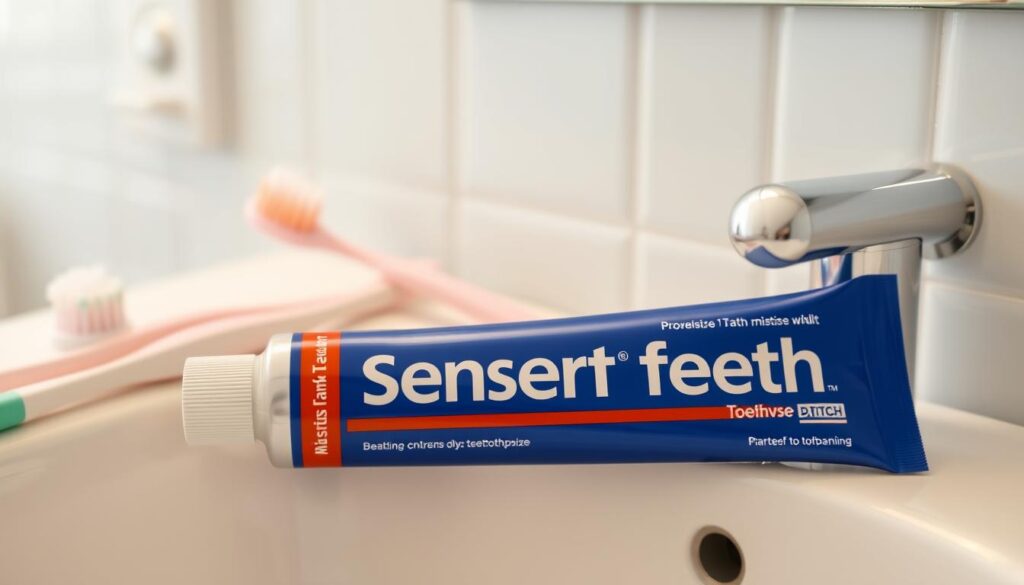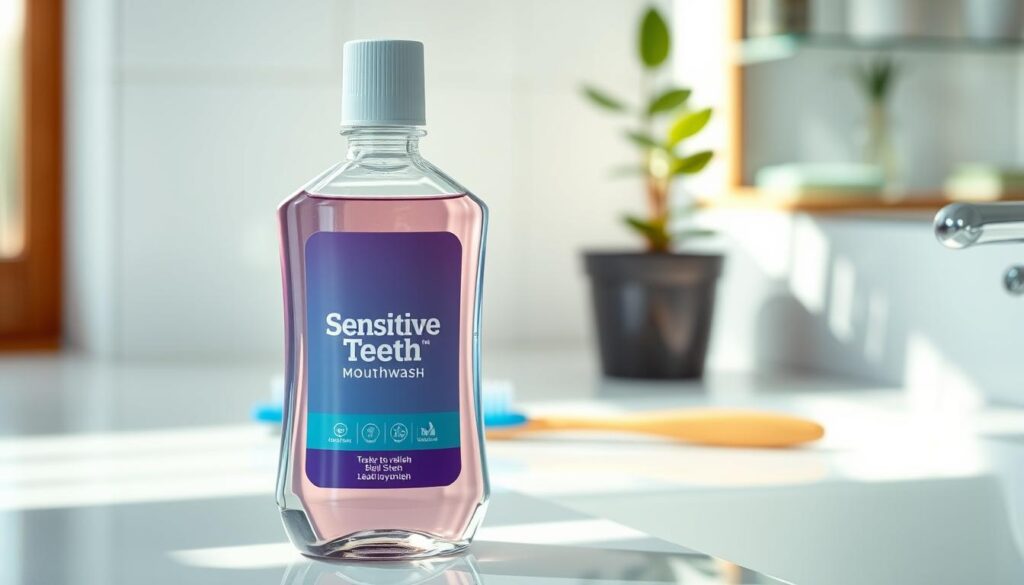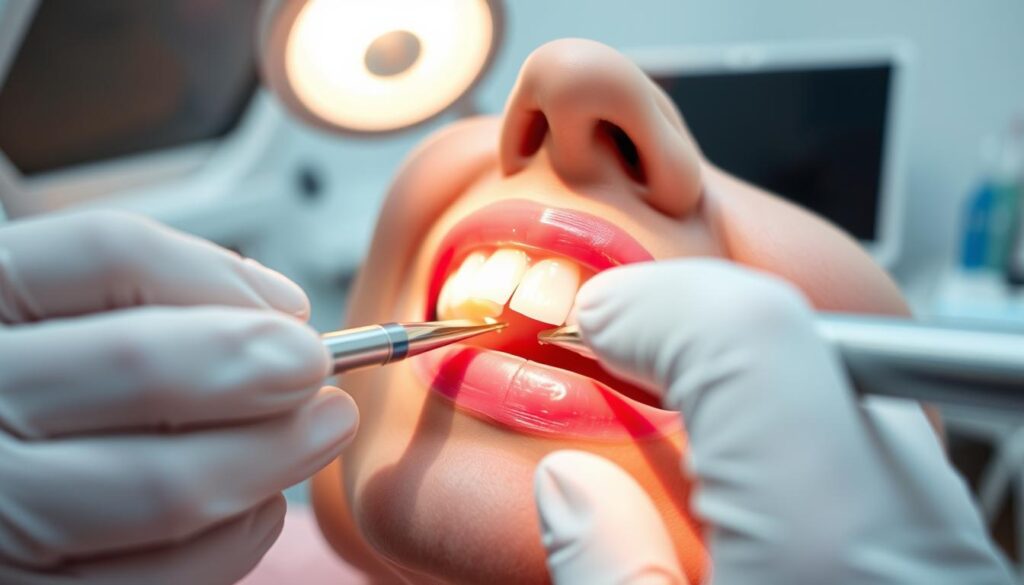Sensitive Teeth? Discover the Best Dental Care Routine
Are you tired of dealing with sensitive teeth? Sensitive teeth can be a real nuisance, but with the right dental care routine, it’s possible to reduce sensitivity and achieve long-lasting relief. Finding the best dental care routine for sensitive teeth is crucial to alleviate discomfort and prevent further issues. A good sensitive teeth dental care routine can make a significant difference in your overall oral health.
By following a well-structured dental care routine, you can reduce tooth sensitivity and improve your overall quality of life. The best dental care routine for sensitive teeth includes a combination of proper brushing, flossing, and using the right toothpaste. Sensitive teeth dental care requires a gentle approach to avoid further irritating the teeth and gums.
Key Takeaways
- Sensitive teeth can be alleviated with the right dental care routine
- A good sensitive teeth dental care routine is essential for overall oral health
- Proper brushing and flossing are crucial for reducing tooth sensitivity
- Using the right toothpaste can make a significant difference in sensitive teeth dental care
- A gentle approach is necessary to avoid further irritating the teeth and gums
- Following the best dental care routine for sensitive teeth can improve overall quality of life
Understanding Tooth Sensitivity: What You Need to Know
Tooth sensitivity can be a real nuisance, affecting everyday activities like eating and drinking. It’s essential to understand the causes and triggers of sensitive teeth to maintain good oral hygiene and prevent further discomfort. Sensitive teeth oral hygiene is crucial in preventing tooth sensitivity, and by following sensitive teeth prevention tips, you can reduce the risk of experiencing tooth sensitivity.
Some common causes of tooth sensitivity include gum recession, tooth decay, and worn-out fillings. When the enamel on your teeth wears away, the dentin underneath becomes exposed, leading to sensitivity. This is why it’s vital to practice good oral hygiene, including regular brushing and flossing, to prevent tooth sensitivity.
What Causes Sensitive Teeth
There are several factors that contribute to tooth sensitivity. These include:
- Gum recession, which exposes the roots of your teeth
- Tooth decay, which can cause the enamel to wear away
- Worn-out fillings, which can leave gaps for bacteria to enter
Common Triggers for Tooth Sensitivity
Certain triggers can exacerbate tooth sensitivity, making it more uncomfortable. These triggers include:
- Consuming hot or cold foods and drinks
- Eating sugary or acidic foods
- Brushing your teeth too hard, which can wear away the enamel
By understanding the causes and triggers of tooth sensitivity, you can take steps to prevent it and maintain good oral hygiene. This includes following sensitive teeth prevention tips, such as using a soft-bristled toothbrush and a fluoride toothpaste, and visiting your dentist regularly for check-ups and cleanings.
Signs Your Teeth Are Becoming Sensitive
Do you experience sharp pains when consuming hot or cold foods and drinks? This could be a sign that your teeth are becoming sensitive. Gentle dental care for sensitive teeth is essential to reduce discomfort and prevent further sensitivity. Using a sensitive teeth toothbrush with soft bristles can help minimize irritation and alleviate pain.
Some common signs of tooth sensitivity include:
- Sharp pains when eating or drinking hot or cold foods and drinks
- Dull aches or soreness in the teeth or gums
- Sensitivity when brushing or flossing
To manage sensitive teeth, it’s crucial to choose the right toothbrush. Look for a sensitive teeth toothbrush with soft bristles and a small head to gently clean hard-to-reach areas. Gentle dental care for sensitive teeth also involves using a toothpaste specifically designed for sensitive teeth.

By taking the right steps and using the right products, you can reduce tooth sensitivity and enjoy a healthier, happier smile. Remember to always prioritize gentle dental care for sensitive teeth to prevent further irritation and discomfort.
| Signs of Tooth Sensitivity | Causes | Solutions |
|---|---|---|
| Sharp pains when eating or drinking | Receding gums, tooth decay, or worn enamel | Use a sensitive teeth toothbrush and toothpaste |
| Dull aches or soreness | Gum disease, tooth grinding, or clenching | Practice good oral hygiene and visit your dentist regularly |
The Best Dental Care Routine for Sensitive Teeth
Establishing a consistent dental care routine is essential for managing sensitive teeth. Using sensitive teeth toothpaste and mouthwash can help alleviate sensitivity and prevent further irritation. By following best practices for sensitive teeth care, you can reduce discomfort and improve your overall oral health.
Morning Dental Care Steps
In the morning, start by brushing your teeth gently with sensitive teeth toothpaste. Use a soft-bristled toothbrush and focus on cleaning all surfaces of your teeth. Then, rinse your mouth with sensitive teeth mouthwash to help kill bacteria and reduce sensitivity.
Evening Dental Care Routine
In the evening, repeat the same steps as the morning, making sure to brush and rinse your teeth thoroughly. Additionally, consider using a desensitizing serum or varnish to provide extra protection against sensitivity.
Weekly Care Practices
Once a week, use a gentle toothpaste and mouthwash to deep clean your teeth and mouth. You can also use a waterpik or interdental cleaner to remove plaque and debris from between your teeth. By following these best practices for sensitive teeth care, you can keep your teeth and mouth healthy and reduce sensitivity.
| Product | Benefits |
|---|---|
| Sensitive Teeth Toothpaste | Reduces sensitivity, gently cleans teeth |
| Sensitive Teeth Mouthwash | Kills bacteria, reduces sensitivity, freshens breath |
Choosing the Right Toothpaste for Sensitive Teeth
When it comes to managing sensitive teeth, using the right toothpaste can make a significant difference. Sensitive teeth toothpaste is specifically designed to help alleviate sensitivity and provide relief. As part of the best dental care routine for sensitive teeth, choosing the right toothpaste is crucial.
Active Ingredients to Look For
When selecting a sensitive teeth toothpaste, look for active ingredients such as potassium nitrate, which helps to desensitize the nerves and reduce sensitivity. Other ingredients like strontium chloride and sodium bicarbonate can also help to strengthen tooth enamel and reduce sensitivity.
Top-Rated Sensitive Teeth Toothpaste Brands
Some top-rated sensitive teeth toothpaste brands include Sensodyne, Colgate Sensitive, and Tom’s of Maine. These brands offer a range of products that cater to different needs and preferences, from gentle whitening to intense sensitivity relief.

How to Apply Sensitivity Toothpaste Effectively
To get the most out of your sensitive teeth toothpaste, apply a pea-sized amount to your toothbrush and brush gently for two minutes, twice a day. Be sure to cover all surfaces of your teeth, including the front, back, and top. By following these tips and using the right toothpaste, you can help to reduce sensitivity and maintain a healthy, happy smile as part of your best dental care routine for sensitive teeth.
Proper Brushing Techniques for Sensitive Teeth
When it comes to gentle dental care for sensitive teeth, proper brushing techniques are essential. Using a sensitive teeth toothbrush with soft bristles can help reduce discomfort and prevent further sensitivity.
To brush your teeth effectively, use gentle circular motions, avoiding harsh scrubbing that can damage the gums and tooth enamel. Pay special attention to the areas where the teeth and gums meet, as these are common areas where sensitivity can occur.
Here are some tips to keep in mind:
- Use a soft-bristled toothbrush specifically designed for sensitive teeth
- Brush for the recommended 2 minutes, twice a day
- Avoid using too much pressure, which can exacerbate sensitivity
By following these tips and using the right sensitive teeth toothbrush, you can help reduce tooth sensitivity and maintain good oral health.
Essential Tools for Managing Sensitive Teeth
When it comes to managing sensitive teeth, having the right tools can make a significant difference. Using a combination of recommended toothbrush types, beneficial mouthwash options, and additional dental care products can help alleviate sensitivity and promote overall oral health.
For individuals with sensitive teeth, using a soft-bristled toothbrush can help reduce irritation and discomfort. Additionally, using a sensitive teeth mouthwash can help desensitize nerves and provide relief. When choosing a mouthwash, look for products that contain ingredients such as potassium nitrate or strontium chloride, which are known to help reduce sensitivity.
Recommended Toothbrush Types
- Soft-bristled toothbrushes
- Electric toothbrushes with sensitive teeth settings
Beneficial Mouthwash Options
Using a mouthwash specifically designed for sensitive teeth can help reduce sensitivity and promote oral health. Some beneficial mouthwash options include:
- Mouthwashes containing potassium nitrate
- Mouthwashes containing strontium chloride
By following best practices for sensitive teeth care, individuals can help reduce sensitivity and promote overall oral health. This includes using a combination of recommended toothbrush types, beneficial mouthwash options, and additional dental care products.

Additional Dental Care Products
In addition to toothbrushes and mouthwashes, there are several other dental care products that can help manage sensitive teeth. These include:
| Product | Benefits |
|---|---|
| Desensitizing toothpaste | Helps reduce sensitivity and promote oral health |
| Fluoride varnish | Helps strengthen tooth enamel and reduce sensitivity |
By using these essential tools and following best practices for sensitive teeth care, individuals can help manage sensitive teeth and promote overall oral health.
Dietary Considerations for Sensitive Teeth
When it comes to sensitive teeth prevention tips, dietary considerations play a significant role. A healthy diet is essential for maintaining good oral health, and certain foods can help alleviate tooth sensitivity. Gentle dental care for sensitive teeth includes being mindful of the foods and drinks we consume.
To reduce tooth sensitivity, it’s essential to limit acidic and sugary foods and drinks. These can erode tooth enamel, making teeth more sensitive. Some examples of acidic foods and drinks include citrus fruits, soda, and sports drinks. Instead, opt for gentle dental care for sensitive teeth by choosing foods that are rich in calcium and fiber, such as dairy products, leafy greens, and whole grains.
Here are some sensitive teeth prevention tips to keep in mind:
- Avoid acidic and sugary foods and drinks
- Choose foods rich in calcium and fiber
- Drink plenty of water to stay hydrated
- Limit coffee and tea consumption, as they can exacerbate tooth sensitivity
By following these dietary considerations and practicing gentle dental care for sensitive teeth, you can help reduce tooth sensitivity and maintain a healthy, happy smile.
| Foods to Avoid | Foods to Choose |
|---|---|
| Acidic and sugary foods and drinks | Foods rich in calcium and fiber |
| Citrus fruits, soda, and sports drinks | Dairy products, leafy greens, and whole grains |
Professional Dental Treatments for Tooth Sensitivity
When it comes to managing sensitive teeth, a best dental care routine for sensitive teeth is crucial. This includes regular dental check-ups to identify and address any underlying issues. Professional dental treatments can provide relief and help prevent further sensitivity.
Sensitive teeth dental care often involves a combination of in-office procedures and at-home care. Your dentist may recommend treatments such as fluoride varnishes, desensitizing toothpaste, or dental bonding to help alleviate sensitivity.

To develop a personalized treatment plan, it’s essential to work closely with your dentist. They can help you identify the underlying causes of your tooth sensitivity and recommend the most effective treatments. By following a best dental care routine for sensitive teeth and seeking professional dental treatments, you can reduce your tooth sensitivity and enjoy a healthier, happier smile.
| Treatment Option | Description |
|---|---|
| Fluoride Varnishes | Applied in-office to help strengthen tooth enamel and reduce sensitivity |
| Desensitizing Toothpaste | Contains ingredients such as potassium nitrate to help block dentinal tubules and reduce sensitivity |
| Dental Bonding | A cosmetic procedure that involves applying a tooth-colored resin to repair damaged teeth and reduce sensitivity |
By combining professional dental treatments with a sensitive teeth dental care routine, you can effectively manage your tooth sensitivity and enjoy a healthier, more comfortable smile.
Natural Remedies and Home Care Tips
For individuals experiencing sensitive teeth, incorporating natural remedies and home care tips into their daily routine can be beneficial. Sensitive teeth prevention tips often involve using desensitizing toothpaste and avoiding harsh mouthwashes. Gentle dental care for sensitive teeth is crucial to reduce discomfort and prevent further sensitivity.
Some effective home care tips include brushing gently with a soft-bristled toothbrush, using a desensitizing toothpaste, and avoiding acidic foods and drinks. Additionally, regular dental check-ups can help identify and address any underlying issues contributing to tooth sensitivity.
Here are some natural remedies to consider:
- Oil pulling with coconut oil or sesame oil to reduce bacteria and inflammation
- Using a saltwater rinse to reduce swelling and kill bacteria
- Applying aloe vera gel to soothe and calm the gums
By incorporating these natural remedies and home care tips into your daily routine, you can help reduce tooth sensitivity and promote gentle dental care for sensitive teeth. Remember to always consult with your dentist before trying any new remedies or treatments.
By following these sensitive teeth prevention tips and practicing gentle dental care for sensitive teeth, you can take the first step towards a healthier, happier smile.
| Remedy | Benefits |
|---|---|
| Desensitizing toothpaste | Reduces tooth sensitivity and discomfort |
| Oil pulling | Reduces bacteria and inflammation |
| Saltwater rinse | Reduces swelling and kills bacteria |
Conclusion: Taking Control of Your Dental Health
In conclusion, maintaining healthy, sensitive-free teeth is achievable with the right dental care routine for sensitive teeth. By understanding the causes of tooth sensitivity, incorporating the best brushing techniques, and using specialized products, you can take control of your dental health and enjoy a comfortable, confident smile.
Remember, your oral well-being is essential for your overall health and quality of life. Consult with your dentist to develop a personalized plan that addresses your unique dental needs and concerns. With patience and commitment, you can effectively manage and even overcome sensitive teeth, paving the way for a lifetime of dental wellness.
Start your journey to a healthier, happier smile today. Implement the strategies outlined in this article, and don’t hesitate to seek professional guidance when needed. Your dental health is in your hands, so take the first step towards a confident, sensitive-free smile.
FAQ
What causes sensitive teeth?
Sensitive teeth can be caused by a variety of factors, including gum recession, tooth decay, worn-out fillings, and even brushing too hard. When the protective layer of enamel is worn down, it exposes the sensitive inner layer of the tooth, leading to painful sensations.
What are common triggers for tooth sensitivity?
Common triggers for tooth sensitivity include consuming hot, cold, sweet, or acidic foods and beverages, as well as breathing in cold air. Brushing and flossing can also sometimes trigger sensitivity, especially if you have receding gums or exposed root surfaces.
How can I tell if my teeth are becoming sensitive?
Signs that your teeth are becoming sensitive include sharp pains or aches when consuming hot or cold foods and drinks, as well as discomfort when brushing or flossing. If you experience any of these symptoms, it’s important to address the issue with your dentist.
What is the best dental care routine for sensitive teeth?
The best dental care routine for sensitive teeth involves using a soft-bristled toothbrush, a sensitivity-reducing toothpaste, and a fluoride mouthwash. Gentle brushing techniques, such as using circular motions rather than scrubbing, can also help minimize discomfort. It’s important to establish a consistent morning and evening routine, as well as incorporate weekly care practices.
What ingredients should I look for in a toothpaste for sensitive teeth?
When choosing a toothpaste for sensitive teeth, look for active ingredients like potassium nitrate, which can help block pain signals from the exposed nerves. Other beneficial ingredients include fluoride, which strengthens enamel, and desensitizing agents like strontium chloride or arginine.
How can I properly brush my teeth if they are sensitive?
When brushing sensitive teeth, it’s important to use gentle, circular motions rather than scrubbing back and forth. Avoid brushing too hard, and consider using a soft-bristled toothbrush to minimize discomfort. Take your time and be mindful of applying only light pressure to your teeth and gums.
What other tools can help manage sensitive teeth?
In addition to a sensitivity-reducing toothpaste, using a fluoride mouthwash can also help strengthen enamel and reduce discomfort. You may also want to consider using a desensitizing gel or applying a thin layer of toothpaste directly to the affected areas before brushing.
How can my diet impact my sensitive teeth?
Consuming acidic and sugary foods and beverages can worsen tooth sensitivity, as they can erode enamel and expose sensitive areas. Try to avoid or limit your intake of citrus fruits, sodas, and other acidic or sugary items, and opt for more tooth-friendly options like water, milk, and crunchy fruits and vegetables.
When should I see a dentist for my sensitive teeth?
If you’ve been following a consistent dental care routine for sensitive teeth and are still experiencing persistent discomfort, it’s a good idea to schedule an appointment with your dentist. They can help identify the underlying cause of your sensitivity and recommend appropriate treatment options, such as in-office procedures or long-term solutions.
What natural remedies can help with sensitive teeth?
In addition to using a sensitivity-reducing toothpaste, you can try incorporating natural remedies like clove oil, which has numbing properties, or applying a thin layer of honey to the affected areas. Avoiding acidic and sugary foods and drinks can also help reduce sensitivity over time.




